LOST 014 - Running The Numbers
An early attempt to lay out The Adversary’s plan in detail. Unpacking the TV show LOST — Season 1: Episodes 18-19

Note: this essay was originally published on Revue on August 15, 2022.
Recently, on LOST: The survivors of Oceanic 815 have proven to be some messy bitches with many dramatic secrets and hidden agendas, and have had a lot of mutual distrust to overcome as a result of that. Overcoming it has become a matter of survival, though—because, as it’s become increasingly clear, there is some other group on the island that means them no good, as well as a monster that means them no good, and at least one polar bear has tried to mean them no good, and a crazy-eyed French lady who meant at least one of them not much good for a little while, and … maybe there are ghosts? Also the boars are getting into a vendetta mood, and the local bald zealot with a million billion knives has found a hatch in the jungle that pairs really nicely with his fervor.
Don’t be afraid, the clown’s afraid, too.
O B S E R V A T I O N
I spent a lot of time in the last installment (too much time, some might say!) talking about the narrative stagnation that attends open-ended dramatic structures that were prevalent in the network TV landscape of the day … and the rest of the Season 1 episodes are going to prove the rule by demonstrating the sudden narrative forward thrust that happens when an open-ended narrative has to end a season and therefore finds it necessary to move that story forward.
Again, for a first time watcher, this might only be vaguely sensed if at all, because it’s still such early days and we’re still getting to know the many many characters—and we’ve explored such a small part of the narrative canvas that it’s possible not to know how big it is, and therefore how little of it we’ve seen. But now, as the writers come to the end of the first big arc, they’re going to tighten up the narrative slack around the Big Hidden Story to get everything really cooking, and start to introduce elements that widen that canvas. We’ve spent the last several hours just watching some stuff, but now? Oh mama, now some things are going to happen.
This is going to be a deep one.
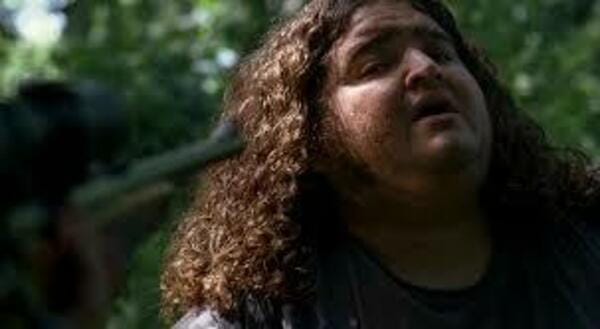
___
Episode 18: NUMBERS (Hurley): Michael, who now has a crew building (and guarding) his escape raft, mentions to Jack that it might be good to have some sort of beacon signal device on deck when they’re out there all hard-to-see in the wide ocean. This leads Jack Of Course to think about visiting Rousseau to get the sort of battery needed to power such a thing, and Sayid argues a bit with Jack about the wisdom of going to a place dubbed “The Dark Territory” to visit the unstable and heavily armed person who abducted and tortured him.
It’s around this point that Hurley—affable, loveable, good-time Hurley—has himself his very first flashback. He’s just seen some numbers on the maps Sayid cribbed from Rousseau,¹ and upon them he sees a string of numbers with which we will become very familiar.
4 8 15 16 23 42
These numbers are very much not OK with Hurley. As we’ll unpack a bit more in Flashbacks below, Hurley won the Mega Millions jackpot with these numbers, and from his perspective they are cursed.
Shaken and stirred, Hurley scams a map from Sayid and heads off down the beach, seeking answers from Rousseau. Realizing that he’s gone, Jack, Sayid, and Charlie mount up. They find Hurley just in time to warn him that he’s about to get perforated and mushed by one of Rousseau’s booby traps. Properly alerted, Hurley dodges it (hey, he’s spry).
The Gang Wants To Know What The Big Deal Is, but Hurley isn’t saying, beyond a specious claim that he simply wants to procure a battery for the raft. However, he’s Hurley, and he’s determined to press on, and they’re good friends, so despite their reservations they all agree to go along with him. There are hijinks and booby traps and unsafe rope bridges aplenty, but eventually Hurley finds himself alone with Rousseau, who reveals that there is a radio tower on the island. Before she overwrote it with her own repeated signal, the tower was broadcasting a man’s voice delivering those numbers … and it was this message that drew her team to the island in the first place. Beyond that she has no answers, but she does agree with Hurley that The Numbers are cursed, and Hurley is so relieved to finally have somebody agree with him that he doesn’t worry about the relative mental stability of the person giving him this affirmation.
Rousseau also gives him a battery, because whatever else Hurley is, he’s the guy who gets shit done.
In the B story, Locke makes Claire a baby cradle, and it’s a bittersweet reminder that there is a lot of good in this man currently being corrupted by an island demon.
In a final shot, we slowly zoom in on Locke’s mysterious hatch. The hatch has a serial number on it.
The serial number is made up of Hurley’s cursed numbers.
The odds of one 10-digit number matching another one is 1 in 10 billion.
End of Episode 18.
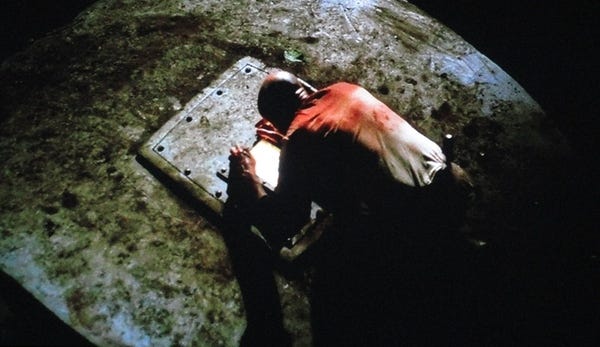
Episode 19: DEUS EX MACHINA (Locke): Those of us who were getting a little impatient waiting for the hatch to come back into the story can thrum with delight now: we’ve got the hatch back! Locke and Boone have excavated a massive amount of the jungle floor around it without finding another entry point; now they try to break the glass window with a makeshift trebuchet. It lacks the power to do the job, and falls apart in the effort in a way that sends some shrapnel into Locke’s leg. Troublingly, the wound doesn’t cause him a bit of pain.
The next day, all this failure causes Boone to lose faith. Locke remonstrates with him, insisting that The Island is testing their faith and will send a sign. And right on cue, he sees a small yellow prop plane—a Beach Craft—trailing smoke as it crosses the sky, low to the ground. Then a lot of freaky David Lynch shit happens, and it becomes clear we’re in Locke’s dream. Locke awakens.
Daytime. Locke brings Boone to the place the Beach Craft was heading in the dream, and they find … the body of a man dressed as a priest, armed with a gun, carrying Nigerian money. New mystery! Going further on, they discover the Beach Craft from Locke’s dream, hanging precariously in some trees about five stories up.
Locke, who has been mysteriously losing sensation in his legs this whole episode, mysteriously loses total use of them now, so it’s up to Boone to climb up into the plane to see what might be in there. Within, he finds a cargo of statues: icons of the Virgin Mary filled with heroin. The plane, already precarious, begins to shift dangerously from Boone’s activity. Locke tries to call him down, but Boone has checked the radio—and it works! And there are people² on the other end!
Boone stays, risking his life to put out a distress call. Then the Beach Craft falls all the way down to the jungle floor, causing Boone to break his everything and rupture all the rest.
Locke, whose leg function returns just as mysteriously as it went (and just as mysteriously as it came in the first place, I suppose), hauls Boone all the way back to the caves, leaving him there for Jack to try to save him, and wanders off back to the hatch, which he pounds against in clear consternation that his faith in The Island has been so badly placed. His mournful reverie is interrupted by a bright light turning on, somewhere within.³
End of Episode 19.
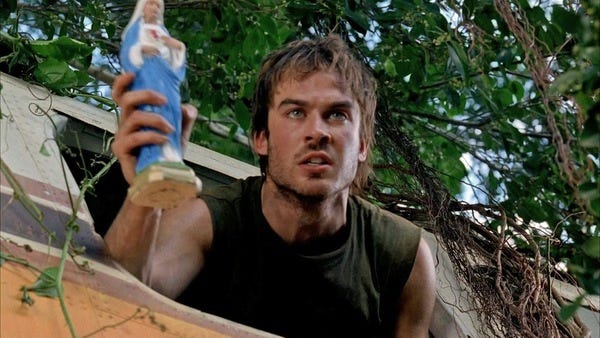
Flashbacks. Hurley at last!
Hurley, we learn, is worth hundreds of millions, the result of a Mega Millions won by playing The Numbers, which he suspects (and we are invited in equal parts to believe or doubt) have been dominating his life ever since. For Hurley the association is entirely negative. As he sees it, from the moment the lottery made him massively wealthy, things started going wrong: his grandpa Tito died, the house he bought for his mother caught on badly rendered CGI fire, a factory he purchased went up in smoke, and disaster and death seems to attend him wherever he goes; meanwhile, he can’t seem to stop profiting off of the havoc he feels he brings to everyone’s life. In present day island action, we learn he even believes that he is at fault for the plane crash that brought them all here.
However, we also learn that things weren’t exactly going good for Hurley before that. Prior to winning the lottery, he was an at-will patient in a mental institution (the reasons are left unknown for now, but suffice to say that deadly accidents were a factor in Hurley’s life before he ever played those numbers, suggesting perhaps that for Hurley, the curse isn’t so much that he would cause bad things to happen but that he would benefit from it). In the institution, Hurley knew a fellow patient named Lenny who didn’t do much except play Connect-4 by himself and mutter those numbers—which is how Hurley thought to use them in the first place. Visiting Lenny back at the institution, Hurley greatly disturbs Lenny by revealing that he’s used The Numbers. “You’ve opened up the box!” Lenny gasps, ominously. Hurley also discovers that Lenny came upon The Numbers with his old navy buddy, Sammy, who now lives in … Australia.
In Australia, Sammy’s widow⁴ discloses that Sammy and Lenny heard The Numbers while manning a Navy listening station in the outback, covering transmissions across the Pacific. The Numbers came across the static one time. Sammy once played them guessing the beans in a jar⁵, and came to believe himself similarly cursed. Eventually, Sammy committed suicide.
As Hurley might say: dude.
Locke’s second flashback shows him at a time further back, before whatever circumstance caused him to lose the use of his legs.⁶ He’s once again depicted as a man of seemingly little professional importance, but still in possession of the natural intelligence, and enthusiasm for games. When he is approached by a woman claiming to be his mother, we learn that Locke has taken more than his share of lumps in life; he was abandoned by his parents, and raised in foster homes but never adopted. Mom tells him that he is special—very special.
Moreover, she claims he was immaculately conceived. Huh.
Locke, reasonably, hires a private detective, who confirms that this lady is his mother, and also suffers from schizophrenia—explaining her more outlandish claim. The detective also finds Locke’s dad, Anthony Cooper, a super-rich fancy pants who is delighted to see his son, and gives a perfectly good reason why biological didn’t bother: Locke’s mother never told Cooper he had a son until very recently. After the two spend some time bonding on a series of hunting trips, though, Locke discovers that Cooper has failing kidneys and needs a transplant, and luckily enough, Locke is a perfect donor. Locke offers almost immediately, and while Cooper makes a show of refusing Locke’s largesse, in the end, he accepts, the seeming dream father touched by his son’s faith in him.
After the operation, Locke wakes up to find his father gone. He realizes, in what we will learn is a lifetime pattern for him, that his faith was poorly placed: he’s been conned. He’s not special; he’s just a dupe. His ‘mother’ truly is his mother (or truly believes she is), but she was conscripted by Cooper to lure in John as a suitable donor. Having gotten what he wanted, Cooper no longer wants anything to do with the son he abandoned … and we will have to wonder (though Locke never does) if Locke was ever even his son at all.
We’ll see Cooper many times again, by the way. In fact, other than Jack’s father Christian, Cooper may be the most significant character to appear in flashbacks.
B E L I E F
If you don’t observe your pudding, you can’t believe in meat. How can you believe in meat if you don’t observe any pudding?
Two big things to dig really deeply into this time (hence only covering two episodes this installment): The Numbers, and The Adversary’s big plan.
1) The Dark Territory. But first, let’s talk about this “Dark Territory.” Like most things LOST, it’s something that never gets directly explained, but which you can piece together from available clues. I’ll highlight these when they come to us much later, but here’s what we’ll see:
The various factions of people on the island are aware of The Adversary’s existence, and have learned certain ways to contain him, some of which appear to involve sonic frequencies, and some of which seem to involve some mysterious ashes.
It’s something that is plot-relevant but very rarely plot-foregrounded. We’ll get into the details when we see details but for now I’ll just say that I believe that while all factions on the island have been infiltrated and corrupted by The Adversary to one degree or another, they’re also aware of it to one degree or another (though I suspect none of them know the extent to which they are corrupted, nor the extent to which The Adversary can overcome their constraints), and have taken measures to prevent it by restricting The Adversary’s physical presence. Hence, there exists an area where The Adversary’s physical presence is unconstrained and more likely to appear. Hence, a “Dark Territory.”
2) You’ve Opened The Box! OK, so let’s get into The Numbers.
Omission is often one of the best ways to highlight narrative importance. We’ve had an episode centering every one of our main characters (in some cases we’ve had characters already get two) … except for one. During my initial watch of LOST, I vividly remember becoming more and more interested in the character who may have otherwise seemed the least complicated: Hugo “Hurley” Reyes, affable island mayor, improvisational golf course designer, and all around good dude. My fascination had little to do with his on-island actions, which rarely if ever seemed to hide any sort of subterranean motives and usually provided much needed comic relief, and much more to do with the increasing likelihood that the longer the delay continued on a Hurley episode, the more likely that this was not a case of just not getting around to him, but a deliberate strategic choice; the writers were protecting a major secret until the proper time.
What, I wondered, is his deal? What are they hiding by holding him back?
Quite a bit, as it turns out—sort of.
On first watch-through, I found this episode intriguing, but no more a Big Episode than any of those that came before or after, and the mystery it presented, in true LOST fashion, left plenty of room for doubt and offered little in the way of explanation. Nor, in true LOST fashion, was any direct explanation ever forthcoming. Certainly many viewers have decided that The Numbers were a red herring, another sign that the creators had no grand plan and were just spinning out mysteries without any thought to resolution.
However, with the benefit of hindsight, I believe The Numbers are of central importance, and the writers knew that the Hurley “numbers” reveal was significant to the Big Story in ways some of the other flashbacks aren’t. I believe they signposted this fact by keeping their easygoing wizard hidden behind his curtain to build anticipation for the moment—it’s only that audiences are used to expecting the big reveal to be an answer, not an even more complicated puzzle. So it always is with LOST.
We’ll see The Numbers again and again; never explained, but always present, seeming to draw our heroes toward their destinies. We’ll even learn that Jacob, who is weary of his endless role, and is seeking his replacement, has associated numbers with each of the main Oceanic survivors (among others)—and it’s the survivors associated with The Numbers who survive the longest. We’ll learn that Locke’s mystery hatch contains a pressure-release valve on a rupture in an energy pocket that threatens to eat the universe, and that the pressure-release is triggered by entering the numbers in sequence.
So what the hell?
It’s worth returning to a point that hasn’t been made for a while:
The story underlying all this drama (as we will eventually discover, but not for five seasons more) is an argument between two godlike beings over the question of the worthiness of human beings. One of them believes they are not worthy. We’re calling this entity “The Adversary.” The other believes they are worthy. We’re calling this entity The Island—as opposed to the physical geographical construct, which we call “the island,” lowercase. However, The Island only “argues” through its human intermediary—at present a man named Jacob—who himself seems to have only a partial understanding of the full nature of the disagreement.
As I unpacked in a much earlier installment, I believe that to The Island, the matter is not so much a disagreement as an experiment, from which (in true scientific fashion) It chooses to keep itself apart, and I believe that the experiment is the universe itself. In fact, I believe as presented in LOST, our universe is an experiment for The Island, a being that exists in a dimensional state that exists outside of our universe.
I believe that for The Island, the subject of the experiment is not so much a question of worthiness, but rather whether beings of free will are capable of change and improvement. But I don’t believe humans alone are the subject of the question, and I suspect they may not even be the primary subject. I believe the constant subject of that inquiry is the being I’m calling The Adversary.
This would explain why The Adversary is allowed to meddle with the experiment, among other things: because while It believes It is the experiment’s conductor, in truth It is the experiment’s subject.
I believe that The Adversary is meant to perform the function in the experiment we see the human Jacob performing: an intermediary between The Island and humans, who are themselves meant to be to The Adversary what The Adversary is to The Island.
I believe that like any experimenter, The Island runs many iterations of Its experiment, to gather as much data on the question as possible. And I believe there have been many, many, many iterations, of which we will only see a part of one.
I think Hurley hasn’t so much gotten himself hooked into The Numbers as he’s become murkily aware of the ways the universe itself is hooked into The Numbers—which I find useful to think of as a sort of dimensional constant. In other words, in this iteration of the experiment, The Numbers are the constant that drives the iteration, and I happen to believe that the huge number that The Numbers comprise is probably the iteration of the universal experiment this happens to be … iteration four billion, eight hundred fifteen million, one hundred sixty-two thousand, three hundred and forty-two, or 4,815,162,342.
I believe that, because these numbers are the constant of this iteration of the universe, they are woven into it in ways that are inescapable. Awareness of them seems to create a drawing power, both between people and The Island, and between one Island-attuned person and another one.
If you were somebody who would someday become very important to an entity that exists outside of time like The Island, then your entanglement with The Numbers would likely also impact you back through the timeline, and you might be far more likely to be far more attuned to The Numbers long before you ever understood their significance.
I think becoming attuned to The Numbers means becoming attuned to dimensional realities far beyond the human mind’s ability to negotiate … which is why awareness of them seems to so often attend mental illness, or a state that approximates mental illness. Much later, we’ll see a similar sort of illness that attends people who become time-displaced.
And Hurley is the person probably most attuned to The Numbers. (Let’s see where he winds up, relative to The Island, by the end of the story.)
Finally, I believe The Numbers are a reality that go so deep that only The Island truly knows about them. The Adversary doesn’t seem to attach much importance to them. Even Jacob doesn’t seem aware of their power.
We’ll get there.
3) Lenny and Sammy. This one doesn’t really matter, but it’s fun. Lenny and Sammy were in the U.S. Navy—and indeed we’ll discover that the U.S. Military is an island-aware entity. So, these two dudes were part of some sort of secret mission, probably one classified enough that an enterprising Republican President could sell reports about it for a good price to the Saudis, and they heard someone sending The Numbers out, as a sort of beacon. Lenny and Sammy, then, are island aware to some perhaps modest degree … but who recorded the message they heard?
The “present day” year of the narrative is 2005, and we know that Rousseau’s signal has been going about 15 years, so the recording with The Numbers was going somewhere around 1990. Lenny and Sammy heard The Numbers around the same time, and they had already been listening for a long time, so the message was probably a recent one, set up in approximately 1990.
It was recorded by a man. It was recorded by somebody who would have known how to set a transmission that would be detectable from outside of the island’s unique geographical situation relative to Earth … like a highly placed member of the Dharma Initiative, say.
We’ll never get this answer, but narrative efficiency being what it is, I believe Lenny and Sammy were hearing a recording from a man who will become known to us; a man who had found his life grotesquely devoted to The Numbers, going slowly insane in the long years after the Dharma staff stopped coming to relieve him, hoping (much like Jacob) to draw a replacement for himself.
I believe it was Radzinsky, the first keeper of the hatch.
We’ll first hear about him next season.
We’ll meet him in Season five.
Hey, this show is a long con.
4) Mousetrap. I’d forgotten this one, but it’s always wise to listen when John Locke explains the rules of a game. Much has been made of Locke’s backgammon exegesis and how it serves as a statement of overall narrative purpose, but I think his Mousetrap apologia serves well as a statement of a much different entity’s purpose—that entity being The Adversary.
Locke explains:
You start with all these parts off the board. And then, one by one, you build the trap … piece by piece, it all comes together. And then you wait until your opponent lands here on the old Cheese Wheel; and then, if you set it just right, you spring the trap.
I believe we are observing one of many iterations in which The Adversary is in contention with, rather than in cooperation with, The Island; an iteration in which It has rejected Its role as Advocate for humans, and has formed a plan against the Island’s experiment. You might say “a trap.”
But what plan? What trap?
I’ll start with something we know: the endpoint The Adversary wants to achieve. This is the destruction of the island, which will bring about the destruction of the experiment—the universe, which, as far as The Adversary knows, is everything.
The Adversary will express this desire as “wanting to go home.” Well, what would “home” be for an entity like The Adversary? What indeed, but the state of reality before The Island started the experiment of the universe, with all its rules and order? The Adversary’s wish to go home, I believe, is a wish to return to such a state: a nothingness, or chaos, or what the Torah refers to as “tohu va-vohu,” or “wild and waste.”
The Adversary wants to destroy the universe.
The best way The Adversary knows to destroy the universe is by piercing the island surrounding the light that exists at the island’s heart.
So, if you’re The Adversary, the question becomes: how do you do that?
Well … you can’t go to the light yourself and pierce into it. The light is guarded by Jacob, who prevents you from knowing where it is, or from going into it. If Jacob were dead, then those protections would be gone … but Jacob won’t let you kill Jacob. He has a policy against it.
You need somebody else to do it.
But even if you got somebody willing to kill Jacob, he’s protected by his remoteness. Nobody ever sees him or knows where he is, or allows others to approach him.
Only Ricardus knows where Jacob is, and only Ricardus can approach him.
But Ricardus knows you. He won’t tell you where Jacob is, and no matter how corrupted the various factions are, they believe themselves working for Jacob’s cause. These factions aren’t led by Ricardus but they do obey him as Jacob’s prophet—and Ricardus isn’t going to bring anybody in who wants to kill Jacob.
You need to establish somebody as a leader—a very special leader, one that all the factions will recognize as being anointed by Jacob, one that even Ricardus will trust enough to allow admission to Jacob, one that Ricardus will obey even despite reservations, if instructed to allow somebody to approach Jacob who may have been groomed to kill Jacob.
And then, once you establish this leader, you need to kill that leader without anybody being sure about the death. And then you need to make sure that leader’s body exists on the island … because you need to become that leader.
You need to construct it all, bringing it together piece by piece, until your opponent steps onto the old cheese wheel. And then you spring the trap.
And that’s what you need to do, if you are The Adversary.
Anyway, that’s what we’re going to see him do.
I believe the person The Adversary’s has selected as his leader—the lynchpin for the trap he’s building—is the Oceanic survivor most thirsty for purpose and meaning: John Locke, an abandoned orphan with intelligence and curiosity and an undefeatable capacity for faith despite repeated betrayals of that faith, a man who will give you his kidney if you tell him he’s special and destined for great things.
Now: there’s a shortcut to this plan, which is to corrupt somebody so thoroughly that they’re willing to ignore the existential danger and pierce into the light themselves. The Adversary almost succeeded at this shortcut with the Dharma Initiative, but in the end, this attempt was thwarted and resulted in the hatch—a Dharma station called The Swan, which exists only to expunge the energies built up from an ill-fated attempt to harness the light.
However, if you can get somebody into The Swan and then convince them to not push the button … mission accomplished.
Using all that belief-work as a springboard, let’s see what The Adversary does in this Locke episode.
I believe we can take it as a given that on the island, The Adversary has power to allow healing and to take it away. We’ll see other instances of this power, but every time John loses his legs, he does so in a place where he’ll see another clue drawing him in toward the Beach Craft.
It needs Locke alive, so It takes away Locke’s legs entirely, forcing Boone into risking himself instead.
But why does The Adversary want Locke to find the Beach Craft?
Answer: I believe It doesn’t care about that.
Or maybe it’s a secondary consideration. The Beach Craft is full of heroin and guns. That’s good for corruption and killing, which are goals of The Adversary. And perhaps It hoped for some accident to take out one of Jacob’s candidates.
But I believe It wanted Locke to find something else; something to which the Beach Craft was only a useful signpost. I believe It wanted Locke to figure out how to access The Swan.
The Swan station is so important, Dharma had another station devoted to acting as an observation post for The Swan, allowing attendants to ensure that the duties therein are being performed. If Locke had accessed it, he would have been able to learn many things about the Swan … including, one presumes, about the side door.
Oh yeah, there’s a side door.
But, as we’ll discover many episodes from now, the Beach Craft’s nose was pointed right at the door to that observation post. When it fell, it landed right on top of the door to that station, covering it up.
Curses! Foiled again!
One must imagine The Adversary happy.
L O S T
Next Time: The Sacrifice The Island Demanded
_____
¹ I had forgotten that there was actually a story payoff to these maps other than Shannon/Sayid kissyface, and here it is: they have The Numbers on them. So that’s nice.
² These are the Tailies, who we won’t see until next season, but clearly the writers have been planning on them already. The Nigerian “priest” and the Beach Craft are also introduced here with details specific enough we can assume they’ve already got a lot of the character work (or Mr. Eko’s, anyway) hashed out.
³ This is Desmond, who we’ll eventually learn is at this very moment about to kill himself, much as others who have fallen into awareness of The Numbers have done. Locke saves Desmond’s life, Desmond saves Locke’s faith, neither of them know about the other. Neat.
⁴ Hurley travelled all the way to rural Australia without making sure he was going to the right house, or finding out whether the man he was looking for was still alive. Hurley, you need an assistant, dude.
⁵ This suggests there were approximately 5 billion beans in the jar, which a math guy who is not me calculates would require a cube about 14.36 feet. Hell of a jar. Maybe the Widow Sammy has her own secrets and is lying.
⁶ Which leads to episode after episode of Locke flashbacks in which something happens to him and makes you think “here it is, the thing that put him in a wheelchair.” Don’t worry; you’ll know it when you see it.
_____
A.R. Moxon is the author of The Revisionaries, which is available in most of the usual places, and some of the unusual places. He’s got a bike, you can ride it if you like, it’s got a basket a bell that rings and things that make it look good.

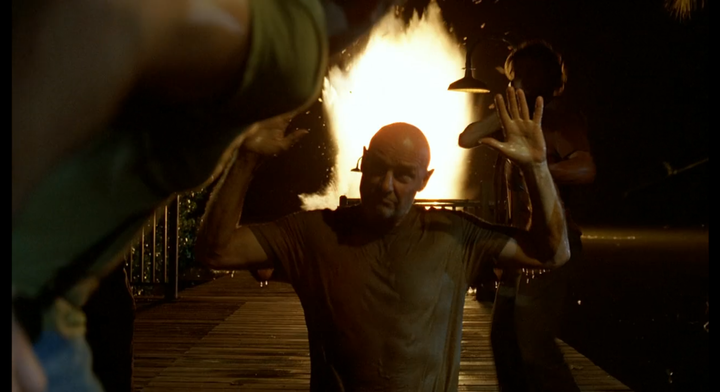
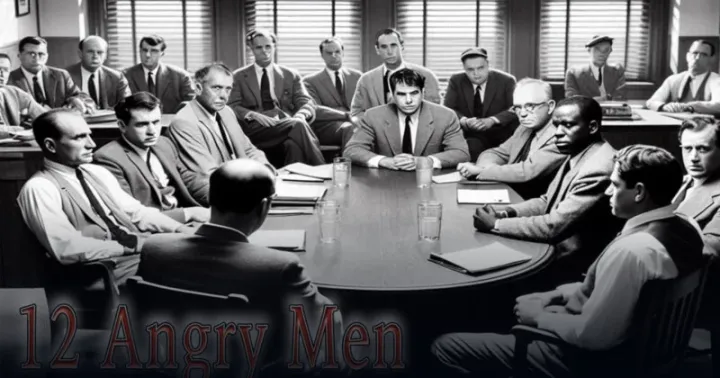
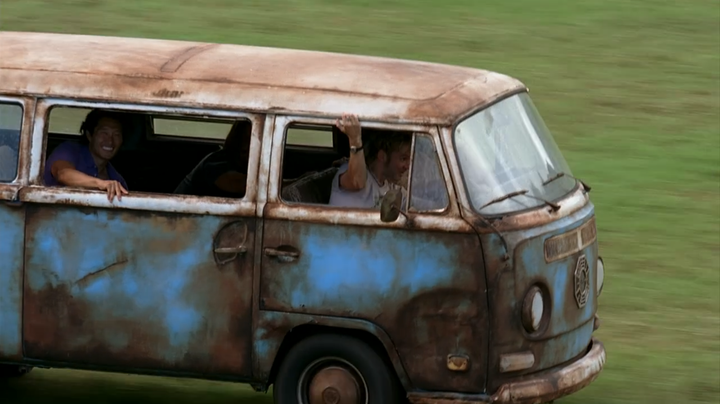
Comments ()